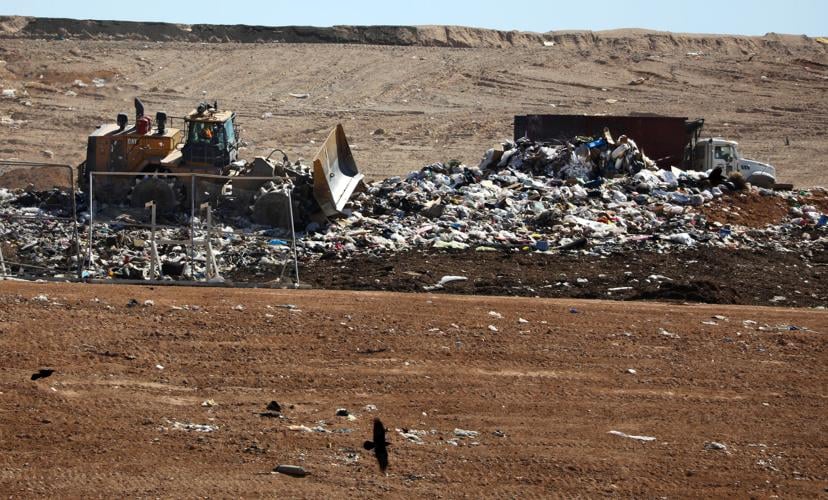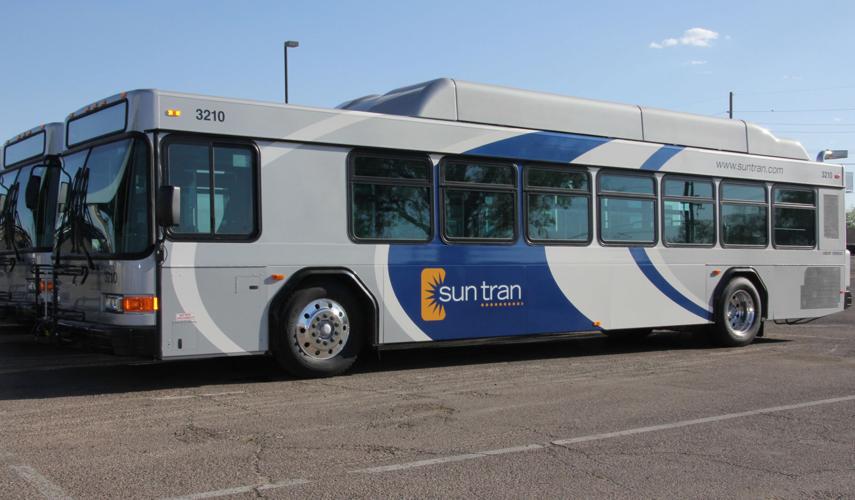A new study shows Tucson can use natural gas from a local landfill to power its buses, an approach that would allow the city to slash greenhouse gas emissions without having to buy costly electric vehicles — but officials have done little to get it done despite knowing about the option for two years.
The natural gas would come from Los Reales Sustainability Campus, a landfill situated northeast of the airport where methane is currently just being burned off and released into the air. If it’s instead captured and cleaned, the city could use it to fuel the 106 “compressed natural gas” buses that already represent nearly half of Tucson’s fleet.
CNG vehicles also release far fewer emissions than the city’s 121 diesel buses and only cost about $575,000, nearly 40% less than the electric buses officials have been buying in an effort to reach carbon neutrality by 2030.
Natural reuse could represent a major piece of progress for Tucson’s overall climate efforts, but it’s not a new concept: Officials have been aware of the opportunity since at least summer 2020, when they hired a local consultant company called GHD to complete the $141,000 study.
City staffers said that despite the time and money, the research brought few revelations and that Tucson is still “in the same situation” with the initiative despite nearly two years of waiting.
“The bottom line is that we’re just not getting the movement I was looking for,“ said Councilman Paul Cunningham. “We’ve done three different studies (and) we have not made a decision. We’re still at the starting block.”
The report recommends that Tucson partner with Southwest Gas to build the facilities needed to process the methane, but the private utility company had already been singled-out for that partnership before the study began, for example.
Southwest Gas also offered to work with the city two years ago, though a company spokesman said negotiations never even reached “a point where a specific scope of work or timeline could be developed.”
The slow progress was also a concern for Councilman Steve Kozachik, who said it “makes the point that we talk solutions to death instead of actually acting.”
Officials have expressed similar sentiments about multiple other climate initiatives recently, some of which — like Tucson’s glass and plastic reuse programs — are also based at Los Reales and are just as slow-moving as the natural gas efforts, according to the city staff.
“I think council member Kozachik and Cunningham’s opinion was that we went through the study, the original proposal from Southwest Gas to build the facility — we went through all of this time and effort, and the primary recommendation out of this is to work with (Southwest Gas) to get it going,” said Carlos De La Torre, Tucson’s director of environmental services who is overseeing the Los Reales initiatives. “We ended up basically in the same situation.”
Tucson also bought 10 electric buses while GHD was completing the study, which typically cost around $1 million each and may no longer be necessary if officials choose to focus on using natural-gas-powered buses instead.
Still, fueling CNG buses with recaptured natural gas won’t even be an option for at least another three years, according to De La Torre. He said officials still need to do tasks such as choosing whether to partner with a private company, making design plans and actually building the needed facilities.
The environmental services director said council members made “fair” criticisms of the program but cited a number of reasons for the slow progress that range from understaffing to lengthy contract processes that city staffers have to go through before partnering with outside firms.
“I certainly concur with the council’s concern about timing. We want to do our best to get things moving, but sometimes our own internal requirements and regulations require us to do our due diligence on moving those projects forward,” he said. “We’re facing (low) staffing levels, same thing with our consultants and our contractors. There’s a lot of that stuff and we’re still continuing to maneuver through that.”
Mayor Regina Romero argued that the study was necessary and that the “highly technical” aspects of the research, like certain in-depth environmental analyses, justified the time frame. She also stressed that the city had to consider all potential private partners, rather than just going with one particular company right off the bat.
A tense back-and-forth between her and Cunningham followed the conversation at a council meeting earlier this month, when the mayor pushed back against the Ward 2 councilman’s criticisms and implied that his expectations were out of whack.
“I have no idea what you’re looking at and I have no idea what the expectations are that you have in terms of how processes are conducted within city business, but there has to be certain steps followed,” Romero said to Cunningham. “Before there’s commentary without fully knowing what has happened, I would suggest that you read the material and that you ask questions about what has been done so far.”
Staffers are expected to provide updates to the council on a regular basis over the next few months so that officials can better monitor the progress of Los Reales initiatives.
Tucson has also applied for federal grants that could provide up to $75 million in funding in the near future, some of which would go toward bolstering efforts at the sustainability campus.





